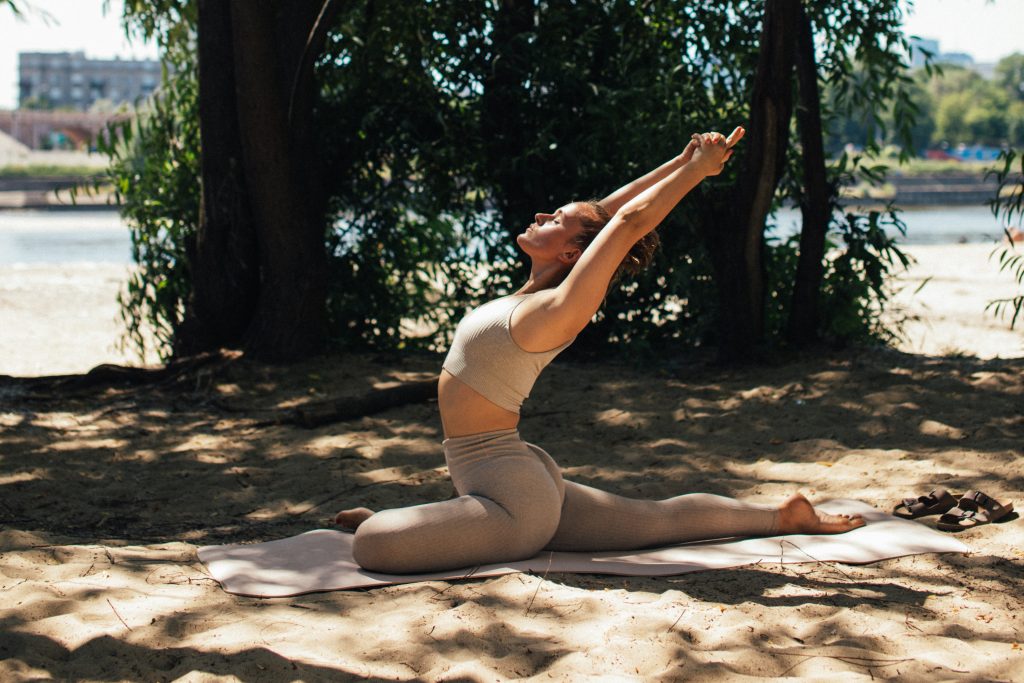Learn how practicing yoga can provide effective relief from anxiety.
Discover the Benefits of Yoga for Anxiety Relief
Feeling anxious? You’re not alone. Anxiety affects millions of people around the world, causing distress and interfering with their daily lives. But what if there was a natural and effective way to combat anxiety? Well, look no further than yoga! Yes, that’s right, yoga – the ancient practice that not only strengthens your body but also soothes your mind. So, let’s dive into the world of yoga for anxiety relief and unlock all its incredible benefits.
Understanding Anxiety: A Brief Overview

Anxiety is more than just feeling stressed or worried. It’s a complex condition that affects your thoughts, emotions, and physical well-being. The science behind anxiety is fascinating. Research suggests that anxiety arises from a combination of factors, including genetics, brain chemistry, and life experiences.
When it comes to genetics, studies have shown that certain genes can predispose individuals to anxiety disorders. These genes can influence the way our brains respond to stress and regulate emotions. Understanding the genetic basis of anxiety can help researchers develop more targeted treatments and interventions.
Brain chemistry also plays a significant role in anxiety. Neurotransmitters, such as serotonin and gamma-aminobutyric acid (GABA), are involved in regulating mood and anxiety levels. Imbalances in these neurotransmitters can contribute to the development of anxiety disorders. Scientists are constantly exploring the intricate mechanisms of these neurotransmitters to develop new medications that can effectively alleviate anxiety symptoms.
Furthermore, life experiences can shape our susceptibility to anxiety. Traumatic events, such as abuse or accidents, can trigger the development of anxiety disorders. Additionally, chronic stress from work, relationships, or financial difficulties can also contribute to the onset of anxiety. Understanding the impact of these experiences on anxiety can help therapists tailor treatment plans to address the underlying causes.
But what does anxiety feel like? Well, it can manifest in various ways, such as racing thoughts, a pounding heart, excessive sweating, or even panic attacks. These physical symptoms are the body’s natural response to perceived threats. When we feel anxious, our bodies enter a state of heightened alertness, preparing us to fight or flee. However, in individuals with anxiety disorders, this response can become exaggerated and overwhelming.
Moreover, anxiety can also impact our cognitive functioning. People with anxiety often experience racing thoughts, difficulty concentrating, and excessive worrying. This cognitive aspect of anxiety can interfere with daily activities and impair decision-making abilities.
If you’re experiencing any of these symptoms, it’s essential to seek appropriate help and support. Anxiety disorders are highly treatable, and there are various evidence-based therapies and medications available. Seeking professional help can provide you with the tools and strategies to manage anxiety effectively and improve your overall well-being.
The Connection Between Yoga and Anxiety Relief
Now, you might be wondering how yoga can help with anxiety. The answer lies in its ability to calm the nervous system and promote relaxation. When you practice yoga, you engage in deep breathing, gentle movements, and mindfulness, all of which have a powerful impact on reducing anxiety levels.
But let’s dive deeper into the science behind this connection. When you experience anxiety, your body’s stress response is activated, triggering the release of stress hormones like cortisol and adrenaline. These hormones prepare your body for a fight-or-flight response, causing increased heart rate, rapid breathing, and muscle tension.
However, when you engage in yoga, you activate the body’s relaxation response. Deep breathing exercises, such as the popular “Ujjayi breath,” stimulate the vagus nerve, which helps regulate the parasympathetic nervous system. This activation leads to a decrease in heart rate, blood pressure, and stress hormone levels, promoting a state of calmness and relaxation.
Moreover, the gentle movements and stretches in yoga help release tension from the body. As you move through various poses, you stretch and strengthen your muscles, releasing built-up physical tension. This physical release also has a direct impact on your mental and emotional well-being, as the mind and body are intricately connected.
Another important aspect of yoga for anxiety relief is mindfulness. During a yoga practice, you are encouraged to stay present in the moment, focusing on your breath, body sensations, and the alignment of your poses. This mindfulness practice helps shift your attention away from anxious thoughts and worries, allowing you to find a sense of calm and inner peace.
Furthermore, yoga provides a safe and supportive environment for self-exploration and self-acceptance. As you engage in the practice, you learn to listen to your body’s needs and honor your limitations without judgment. This self-compassion and acceptance can be incredibly empowering and healing, especially for individuals struggling with anxiety.
So, when you step onto your yoga mat, you are not just engaging in a physical exercise. You are embarking on a journey of self-discovery, self-care, and anxiety relief. Through the combination of deep breathing, gentle movements, mindfulness, and self-compassion, yoga offers a holistic approach to managing anxiety and promoting overall well-being.
Different Yoga Styles for Anxiety Relief
Now that you understand the connection between yoga and anxiety relief, let’s explore some different yoga styles that can work wonders for calming your anxious mind.
Yoga has been practiced for centuries and has become increasingly popular in recent years as a holistic approach to health and well-being. One of the many benefits of yoga is its ability to reduce anxiety and promote relaxation. By combining physical postures, breathing exercises, and meditation, yoga provides a comprehensive approach to managing stress and anxiety.
Hatha Yoga for Beginners
Hatha yoga is the perfect starting point for beginners. It focuses on slow and gentle movements, allowing you to build strength and flexibility while calming your mind. With Hatha yoga, you’ll learn to surrender to the present moment and let go of any worries or stresses that are weighing you down.
The practice of Hatha yoga involves holding poses for longer periods of time, which helps to improve balance, increase flexibility, and promote a sense of inner peace. As you move through the poses, you’ll learn to synchronize your breath with your movements, creating a meditative state of mind.
One of the key principles of Hatha yoga is the concept of “yoga asanas,” which are physical postures that help to balance the body and mind. These postures are designed to stretch and strengthen the muscles, improve circulation, and promote relaxation.
Restorative Yoga for Deep Relaxation
If you’re looking for deep relaxation and rejuvenation, restorative yoga is your go-to practice. Restorative poses involve using props to support your body in various positions, allowing you to completely surrender and let go. It’s like floating on a cloud of tranquility – the ultimate escape from anxiety!
Restorative yoga is a gentle and passive form of yoga that focuses on relaxation and restoration. The poses are held for longer periods of time, typically ranging from 5 to 20 minutes, allowing your body and mind to fully relax and release tension.
During a restorative yoga practice, you’ll use props such as bolsters, blankets, and blocks to support your body in comfortable positions. This support allows you to completely relax and let go, promoting deep relaxation and stress relief.
Restorative yoga is particularly beneficial for those who are experiencing high levels of stress or anxiety. By slowing down and allowing yourself to fully relax, you’ll activate the body’s relaxation response, which helps to reduce anxiety and promote a sense of calm.
Whether you choose Hatha yoga or restorative yoga, both styles offer unique benefits for anxiety relief. By incorporating these practices into your routine, you can experience the transformative power of yoga and find peace and tranquility in the midst of a busy and stressful world.
Yoga Poses for Anxiety Relief
Are you ready to dive into some specific yoga poses that will help alleviate your anxiety? Great! Here are a few easy and advanced poses to get you started:
Easy Yoga Poses to Start With
If you’re new to yoga or just looking for some gentle poses to ease into your practice, these easy yoga poses are perfect for you:
- Child’s Pose: This gentle forward bend stretches the lower back and promotes deep relaxation. As you sink your hips back towards your heels, allow your forehead to rest on the mat and let go of any tension in your body. Take slow, deep breaths and feel the calming effect of this pose.
- Mountain Pose: Stand tall, root your feet into the ground, and feel a sense of stability and strength. Imagine yourself as a mountain, grounded and unshakeable. Engage your core, lengthen your spine, and take a moment to find balance and stillness in this pose.
- Seated Forward Fold: Lengthen your spine and surrender into this calming pose that releases tension in the back. Sit on the edge of a folded blanket or bolster to elevate your hips and make the pose more accessible. As you fold forward, focus on the sensation of your breath moving in and out of your body, allowing any anxiety or stress to melt away.
Advanced Yoga Poses for Anxiety Relief
If you’re looking to challenge yourself and take your yoga practice to the next level, these advanced yoga poses can help you find relief from anxiety:
- Headstand: Upside down you go! This inversion pose boosts circulation, increases focus, and improves overall well-being. Start by practicing against a wall for support and gradually work towards balancing in the middle of the room. As you find stability in your headstand, feel the rush of blood to your brain and the sense of calm that comes with it.
- Camel Pose: Open up your heart and expand your chest in this energizing pose that promotes confidence and release of anxiety. Kneel on the mat with your knees hip-width apart and slowly lean back, placing your hands on your heels. Lift your chest towards the ceiling and allow your head to gently drop back. Breathe deeply into your heart space and embrace the vulnerability and strength of this pose.
- Supported Shoulderstand: Elevate your legs and get a fresh perspective while relieving anxiety and calming the mind. Lie on your back and lift your legs up towards the ceiling, supporting your lower back with your hands. Find stability in your shoulders and engage your core to hold the pose. As you invert, feel the sense of lightness and rejuvenation wash over you, leaving any worries or anxious thoughts behind.
Remember, yoga is a journey and it’s important to listen to your body. Take your time with these poses, and if something doesn’t feel right, modify or skip it. With consistent practice, these yoga poses can become powerful tools for managing anxiety and finding peace within.
Incorporating Yoga into Your Daily Routine
Now that you have a taste of the incredible benefits of yoga for anxiety relief, it’s time to make it a part of your daily routine. Here are some tips to get you started:
Tips for Starting a Yoga Practice at Home
Create a dedicated space for your yoga practice – it could be a corner of your living room or a serene spot in your backyard. Set aside a specific time each day for your practice and stick to it. Start with shorter sessions and gradually increase the duration. Remember, consistency is key!

Making the Most of Your Yoga Practice
As you embark on your yoga journey, embrace the process and let go of expectations. Be patient with yourself and honor your body’s limits. Listen to your breath, flow with the practice, and allow yourself to fully experience the joy and tranquility that yoga brings. The more you commit to your practice, the more profound the benefits will be!
Discover the Benefits of Yoga for Anxiety Relief: Closing Thoughts
In conclusion, yoga is a powerful tool for reducing anxiety and promoting overall well-being. By understanding anxiety, exploring different yoga styles, practicing specific poses, and incorporating yoga into your daily routine, you can unlock the incredible benefits that yoga offers for anxiety relief. So, roll out your mat, breathe deeply, and embark on a journey of self-discovery and inner peace!







